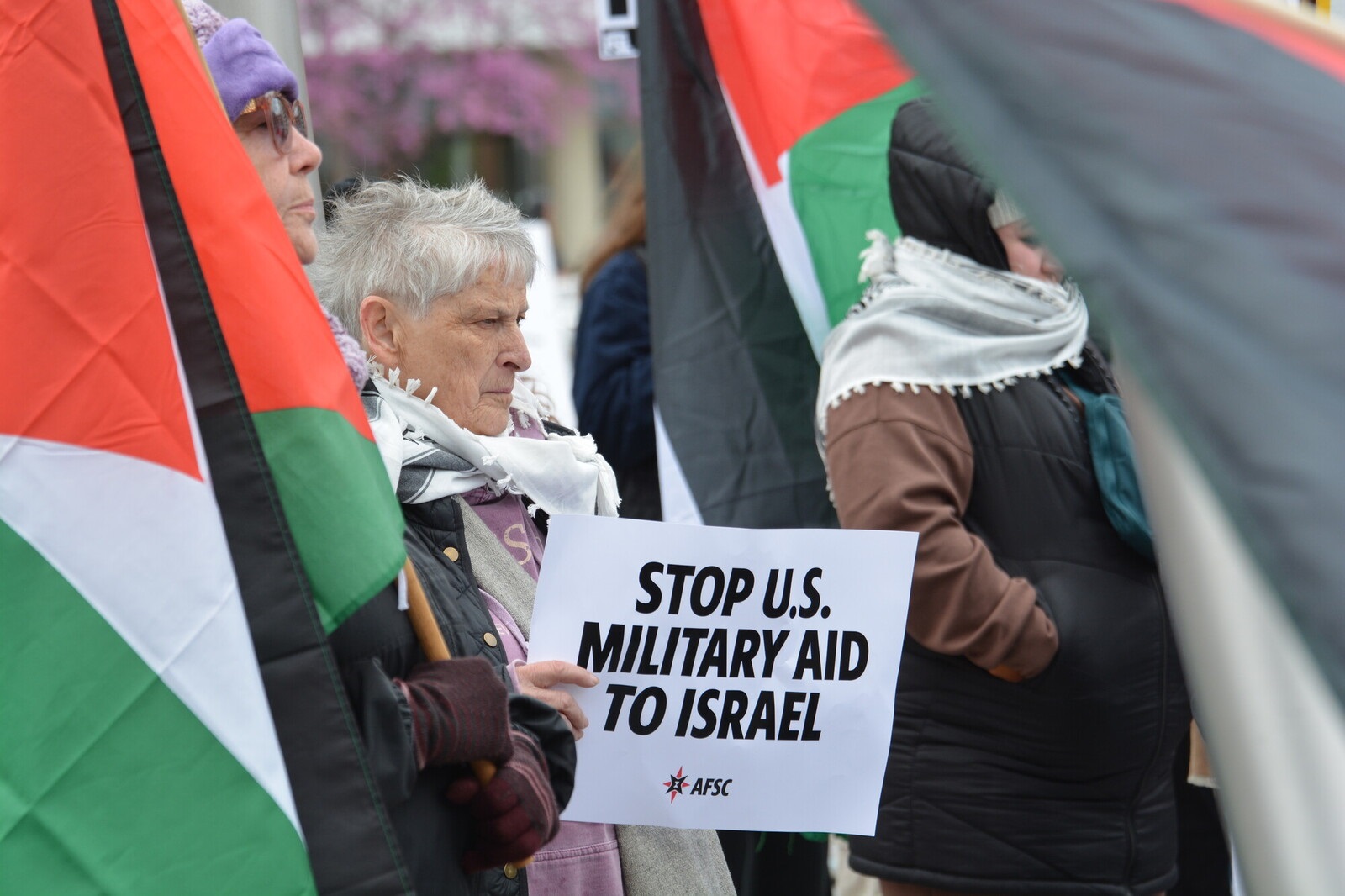
For nearly a year, the genocide in Gaza has stoked tensions in the region, bringing us closer to a full-scale regional war. Since Sept. 17, 2023, at least 2,000 more people have been killed in Israeli attacks on Lebanon. Others have died in Israeli attacks on Syria and Yemen. On Oct. 1, 2024, Iran fired missiles at Israel, marking a new stage in the already heightened situation in the region.
AFSC mourns all who have been killed or injured. As we have throughout our history, AFSC opposes violence in all its forms. We will keep up our work for the changes needed to end violence and build a just and lasting peace.
There is a clear path to stop this violence in Lebanon, Gaza, the West Bank, and across the region. The U.S. must enact an immediate arms embargo on Israel and demand a permanent cease-fire in Gaza. These actions would end the genocide in Gaza and reduce tensions in the region.
As we keep up our call for peace, understanding the context is crucial. Here are five things you need to know:
1. Israel’s invasion of Lebanon follows a year-long exchange of attacks between Hezbollah and Israel.
On Oct. 8, 2023, Hezbollah fired rockets toward Israeli military bases located in Lebanese territory occupied by Israel since 1967. Israel responded by bombing Lebanon. Hezbollah said its attacks were a response to Israel’s attacks on Gaza, which came after the Oct. 7 Hamas attack in Israel.
Between Oct. 8, 2023 and Sept. 6, 2024, there were 9,613 armed exchanges between Israel and parties in Lebanon, according to the Armed Conflict Location and Event Data. Israel has carried out 82% of these attacks, killing at least 646 people in Lebanon and displacing 100,000 more.
During the same period, Hezbollah and other groups in Lebanon carried out 1,768 attacks against Israel. At least 32 Israelis have been killed and around 60,000 have been forced from their homes.
Israel’s attacks have also included targeted assassinations of Hezbollah leaders, including Fuad Shuker on July 30 and Hassan Nasrallah on Sept. 27.
Hezbollah had said that it would end its attacks on Israel if Israel agreed to a permanent cease-fire in Gaza. Yet Israel has only continued to escalate the conflict with HezboIlah.
2. Israel’s attacks on Lebanon are illegal and risk regional war.
On Sept. 17 and 18, 2024, Israel remotely exploded electronic devices allegedly belonging to members of Hezbollah. Videos show explosions in supermarkets, hospitals, homes, and even at funerals. Those who triggered these explosions had no way of knowing who was holding these devices or where they were. Many of the people injured or killed were not involved in active conflict, including a diplomat, doctors, and other civilians, and a 9-year-old girl.
Under international law, such indiscriminate attacks are considered war crimes. The use of booby traps is also explicitly prohibited by a treaty that both Israel and Lebanon have signed. The U.S. and international community must hold accountable those responsible for violations of the law.
Israel followed the pager attack by assassinating Hassan Nasrallah, the head of Hezbollah, in a bombing in Beirut. Since then, Israel has intensified its indiscriminate bombing across Lebanon and launched a ground invasion of Southern Lebanon.
In response to all these actions and the earlier Israeli assassination of Hamas leader Ismael Haniyeh in Tehran, Iran launched nearly 200 missiles toward Israel on Oct. 1, 2024. The missiles struck several military targets and caused damage in civilian areas.
War has already spread from Gaza to Lebanon, and regional escalation could continue if a cease-fire is not reached.
3. There is a way to prevent further violence and escalation.
The escalation in Lebanon and the attacks carried out by both Hezbollah and Israel stem directly from Israel’s genocide in Gaza. Over the past year, Israel has killed at least 41,000 Palestinians and displaced over 90% of Gaza’s population. Children are starving. Polio and other diseases are spreading.
This year has also seen record levels of violence in the West Bank. Since Oct. 7, at least 700 Palestinians have been killed by Israeli soldiers and settlers in the West Bank. Nearly a quarter of those killed have been children. At least 10,700 Palestinians in the West Bank have been detained, and over 4,500 have been forcibly displaced.
The path toward peace is clear. Hezbollah has pledged to stop its attacks on Israel if there is a cease-fire in Gaza. A cease-fire would end the genocide in Gaza and prevent a catastrophic regional war.
4. The U.S. must stop fueling violence in the region.
Over the last year, the U.S. has provided Israel with more than $20 billion in military assistance and support. Even while claiming to support cease-fire efforts, the U.S. has shipped Israel bombs that are being used to obliterate families in Gaza. Israel has also deployed U.S. bombs against people in Lebanon.
U.S. funding for Israel has continued for decades despite global concerns over Israeli policies and actions, providing $3.8 billion in military funding annually. The U.S. keeps up its support even as Israel refuses a cease-fire, opposes a Palestinian state, and faces accusations of war crimes and genocide.
The United States must enact an immediate arms embargo on Israel. If the U.S. stopped sending new weapons, it is estimated that Israel would run out of key armaments in less than two months.
For violence to end, U.S. policy must change. The U.S. must join other countries in calling for accountability for Israel and an end to Israeli apartheid.
5. You can take action to help bring change.
Everyone can speak out to stop the violence and end the occupation. Here are a few things you can do right now.
Tell Congress to stop the spread of war across the Middle East. Urge them to insist that Israel adhere to international humanitarian and human rights law and end attacks in Lebanon and other countries. Demand that they support an arms embargo on Israel and call for a permanent cease-fire for Gaza.
Donate to humanitarian aid efforts in Gaza. AFSC’s staff in Gaza is providing food, water, hygiene kits, and other life-saving aid to displaced Palestinians. Your support will help individuals and families impacted by the ongoing attacks.
Join the Apartheid-Free campaign. Quaker meetings, congregations, communities, and other groups are taking action to oppose Israeli occupation, apartheid, and settler colonialism that are at the roots of violence in Israel and Palestine. Learn more about how you can join us.
Learn more. Explore our resources and learn more about ASFC’s humanitarian work on the ground in Gaza and our advocacy efforts in the U.S.
